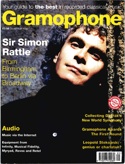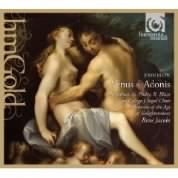Texte paru dans: / Appeared in:
|
|
|
Reviewer: Jonathan Freeman-Atwwod No more apologies for this work. Historically in the shadow of Purcell's Dido, Venus and Adonis is fast becoming a recognized masterpiece of smallscale baroque drama. Blow draws considerable inspiration from French chamber opera both in matters of constitution and balance, though Venus and Adonis is still a distinctly English work with its poised, understated dialogue and an emotional denouement where Adonis's death from the tusks of a boar is touchingly tender in its measured, if demonstrative grief; the effect is not far removed from Dido's lament, though Purcell 's tragic vein is ultimately untouchable. There are, however, some superb examples of indigenous word-setting and declamatory arioso which put Blow in the Purcell bracket in several instances, not least in Cupid 's forthright scene-setting, sung with increasing assurance by Robin Blaze. Indeed, Rene Jacobs surrounds himself with many fine singers here, all of whom he marshals in lively and responsive performances. Rosemary Joshua is an irresistible Venus, who wastes not a word either in colourful representation or vocal suppleness, and Gerald Finlay's reflective longing accords with Jacobs's elegant and full-flavoured direction. More continental in nuance than Philip Pickett's direct and tightly-wrought account, Jacobs lends a gentle francophile accentuation to the dances rather than Pickett's deliberately organized characterization.
I t is hard to choose between Catherine Bott's classical bearing and Joshua 's sensual realism, and between Finlay and Michael George, both of whom deliver agreeably resonant performances. In terms of atmosphere - of which Blow is a tantalizing master - Pickett takes some beating in the languorous 'In these sweet groves' and the Westminster Abbey School Choristers convey more of the humour and charm of the famous Cupid's lesson than Jacobs 's brats (really the women of Clare College) who over-egg the pudding. Yet there is a nobility in the initial exchanges between the protagonists which, although it constitutes little more than spouting the other's name, is elevated by a doleful shimmer of recorders, which under Jacobs augurs much in its funereal symbolism. These responsive instrumental interjections from the OAE are even more effective in 'Hark, hark the rural music sounds'. Indeed, for all the mercurial magic of Pickett, the range of dramatic sensibility from Jacobs gives this new account an extra layer of realization and colour. There's colour, too , in the fact that Venus and Adonis was first performed with Charles II’s mistress Moll Davis as Venus, and Cupid played by his illegitimate daughter, Lady Mary Tudor.
Since Sir
Anthony Lewis's inaugural recording from 1953 (L'Oiseau Lyre, 3/54 - nla), then,
we have had the Consort of Musicke's pioneering 'period' account, and London
Baroque under Charles Medlam with Lynne Dawson as Venus, and all have been
largely overtaken by The New London Consort under Pickett. This admirable new
recording puts the work on yet another footing. |
|
|
|
|
|
Cliquez l'un ou l'autre
bouton pour découvrir bien d'autres critiques de CD |
|




